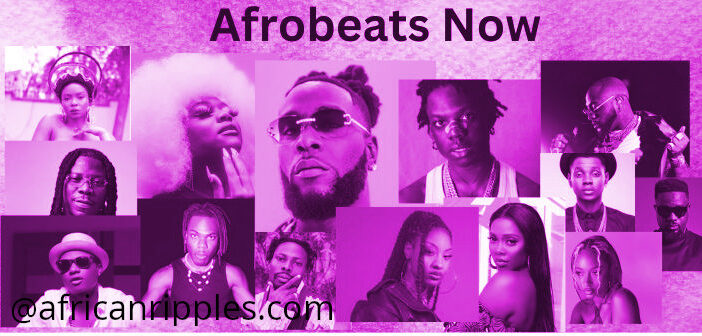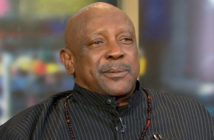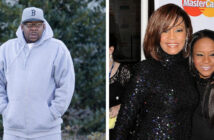Afrobeats music, which has its roots in West Africa, has now become a global sensation with stratospheric growth over the past ten years. Afrobeats combines African rhythms and melodies with western influences, such as hip-hop, R&B, and pop, to create this West African brand of music.
Much has been written about its origin, what qualifies as an Afrobeats song and what lies in the future for the current African musical wave that’s taking the world by storm.
The article presents a possible chronological order of the evolution of Afrobeats music, the various cultures that influenced it, and the prominent artistes at play in the process. I used the word ‘Evolution’ with strong emphasis as compared to ‘Origin’ which has become a sort of online dispute between Nigerians and Ghanaians with respect to Afrobeats music.
Osibisa
In 1962, Ghanaian highlife artist, Teddy Osei, moved to London UK to study music. Later in 1969, Osei persuaded his former band members, Sol Amarfio and Mac Tontoh (brother) to join him in London. They would later form the nucleus of the popular group, Osibisa.
With their mix of African and Western musical genres, Osibisa are credited with popularizing African music in Europe and North America, They incorporated elements of rock, progressive rock, acid rock, Latin, jazz, afro-funk, jazz fusion, soul, highlife, reggae, calypso and pop into that band’s style. Over time, their music style has been classified as afro rock, progressive rock, Afro-pop and highlife.
Joining the three Ghanaians in the first incarnation were Antiguan Wendell (Dell) Richardson (lead guitar and lead vocalist), Nigerian Lasisi Amao (percussionist and tenor saxophone), Grenadian Roger Bedeau also known as Spartacus R (bass) and Trinidadian Robert Bailey (keyboards). Nigerians Mike Odumosu and Fred Coker (bass guitar) were later replacements.
Orlando Julius-Ekemode
Songwriter, singer, saxophonist and keyboard player, Orlando helped to transform the Nigerian music scene in the 1960s with highly commercial, ground-breaking fusions that influenced Fela Kuti’s Afrobeat. He began experimenting by combining traditional music with horns, guitar, and American genres, a combination that later became known as afrobeat.
Early in his music career, Julius was playing drums, flute with juju and konkoma bands. In order to play Highlife music, he mastered the saxophone. Eventually, he performed alongside highlife maestros such as Jazz Romero, Rex Williams, and Eddie Okonta.
He had his first hits with 1965’s “Jagua Nana” and also the 1966 album Super Afro Soul. Orlando was heavily influenced by African American artistes such as Hugh Masekela, Herbie Hancock, The Pointer Sisters, and Grover Washington Jr., Lamont Dozier, James Brown, and The Crusaders.
Fela Anikulapo-Kuti – Afrobeat
A young Fela took note of Orlando’s music exploits and regularly attended his concerts in Southwestern Nigeria, Orlando would often allow Fela to join his band while performing on stage.
The combination of traditional music of that era, predominantly Highlife, with American genres came to be known as Afrobeat, a term coined by Fela Kuti. Many have erroneously attributed Fela as the pioneer of Afrobeat but historically, the fusion of West African music with Western influences predates Fela.
The music of Fela is a complicated fusion of jazz, funk, highlife, and traditional African chants and rhythms that he mostly invented. It is comparable to James Brown’s music and features psychedelic soul characteristics. Fela’s Afrobeat also makes a lot of “tinker pan”-related borrowings. Afrobeat was founded in part by Fela’s drummer of twenty years, Tony Allen, he was essential to the existence of Afrobeat.
According to Tony Allen, in the early stage of Fela’s career, it was his Ghanaian promoter, Raymond Azeez, that suggested the name Afrobeat, prior to that it was called Highlife Jazz.
Highlife, Afrobeat and RnB/HiHop
Afrobeat(s) could be easily conflated with earlier Afrobeat (without the s), however, these are two different genres, but with a basic commonality – they were both essentially the fusion of African music with contemporary Western/American influences. However, while Highlife played a major influence in the earlier Afrobeat, RnB/HiHop is the dominant factor in the emergence of the current Afrobeats. Afrobeats is basically a fusion of African cultural/traditional music with US Rhythm and Blues, Hip-hop and the likes.
When Orlando relocated to the US in the late 70s, Fela would remain the only artiste in Nigeria playing that particular brand of music. Fela carried the torch of Afrobeat all by himself for decades until Femi Kuti, his first child, released his debut album ‘No Cause For Alarm’ in 1991. Throughout his tumultuous music career in Nigeria, people embraced Fela’s music but his fellow local musicians would not emulate his musical style which was deemed too radical back then. Fela was always in trouble with the military governments of that period.
From Osibisa to Baba Wemba, Manu Dibango, Yussuf N’Dour, Kofii Olomide, Baba Maal to Angelique Kidjo– African musicians have always been fusing western style into their respective genres. If we were to look at music fusion from a culinary perspective, Fela would be regarded as the Masterchef due to the way he took the art to a higher level.
It is one thing to recognize Fela as a African/Global music icon, it is another to conflate his music with the current Afrobeats. Any ardent follower of Fela’s Afrobeat can easily note the lack of relationship between the two genres.
Back in the 90s, Nigerian musicians were deep into Reggae, traditional music like Juju, fuji, RnB/HipHop. Few artistes, apart from Femi, were playing Fela’s style in the 90s – Alariwo of Africa, Dede, Aiyetoro etc. Seun Kuti started his career much later after the death of his father in 1997. Nigerian music went through radical transformations toward the end of the 90s. Some old genres died off and new ones came in.
Unlike in Ghana, where Highlife remained a staple of their mainstream music, the opposite was the case in Nigeria.
In Nigeria, especially Lagos and its environs, since the 1970’s, Juju, Fuji and other local genres had pushed Highlife out of the mainstream, although it remained relevant in the southeastern part of the country. A good example of an Afrobeats song with a Highlife touch is CKay’s Love Nwantiti, Ckay was born in Northern Nigeria of Igbo, South-Eastern parents.
Afrobeat(s) – ‘Shako Mo’, A New Beginning for Nigerian music
The music genre that is currently referred to as Afrobeats was set in motion by the Nigerian group The Remedies in 1998 when they released their debut single ‘Shako Mo’ (pronounced Sharkor Mor), which was sampled from MC Lyte’s Keep On, Keeping’ On (which itself was originally sampled from Michael Jackson’s Liberian Girl). ‘Shako Mo’, with its catchy beats and melodious chorus became an instant hit in Nigeria.
Eedris narrated the emergence of The Remedies on the Netflix series, ‘Afrobeats – The Backstories’:
“One night after like six months, I dreamed and God said that you need to leave the under the bridge and go to Raypower FM”.
Eedris was at that time sleeping under the CMS bridge in Lagos, then after several attempts of visiting Raypower FM, luck shined on him one day when he met the late radio DJ, Steve ‘Sleek’ Kadiri, who connected him with Kenny Ogungbe, another radio broadcaster then who, alongside his partner Dayo ‘D1’ Adeneye, played a crucial role in the emergence of what is now being called Afrobeats. Remedies was created at Raypower FM in the middle of a radio program with Eedris and Eddy as the original members, Toni was a later addition to the group.
The Remedies, featuring Eedris (rapper), Eddie Montana and Toni Tetuila, were heavily influenced by American RnB/Hip-hop, which they fused with traditional African rhythms. The success of ‘Shako Mo’ set the tone for similar groups to emerge, notable among them were Plantashun Boys; Tribesman; Triple B.; Ruff, Rugged and Raw; Maintain and a host of others. 2Face Idibia would later emerge from the Plantation Boys to record the global hit single African Queen.
It should be noted that back then, this new genre was locally referred to as Nigerian Jams or Naija Jams, and later Afropop, until finally Afrobeats. It had no relationship with Fela’s Afrobeat lyrically or instrumentality. It was not a continuation of Fela’s legacy but a birth of a new genre.
It is common nowadays to read articles online or watch TV shows in which a particular individual is referred to as the ‘Pioneer’ of Afrobeats music. It is too simplistic to refer to any single individual or group as the pioneer of the current Afrobeats. Prior to the release of ‘Shako Mo’ in the 90s, Nigerian artistes were experimenting with different kinds of music styles like Calypso, Reggae/Ragamuffin/Dancehall, RnB/HipHop, Jazz, Makossa, Soukous etc. In Nigeria, Reggae/Dancehall was huge in the early 90s but by the late 90s, the dominant musical influence was RnB/HipHop, Remedies happened to strike the right tune at the right period.
The emergence of Afrobeats music is best described as a result of evolution rather it being pioneered by a particular artist or group. In the 90’s, there were lots of artistes at play in this evolution, especially in Lagos, such a list would be too cumbersome for this article. ‘Shako Mo’ was unique in this regard because of its trail-blazing, catalytic effect on subsequent and upcoming artistes.
‘The Remedies’ paved the way for the likes of D’Banj, P Square, 9ce, Tiwa Savage, Yemi Alade, Burna Boy, Davido, Wizkid, Sarkodie, Runtown, Sauti Sol, Olamide Badoo etc. Current star, Asakę cut a niche for himself with his unique style of blending Fuji music (popular Yoruba genre) with his own brand of Afrobeats. The release of ‘Shako Mo’ was the major catalytic event that ushered in a new dawn of African music being consumed across the globe.
In the Netflix series, ‘Afrobeats – The Backstory’, narrated by Ayo Shonaiya, which is a must-watch for any fan of Afrobeats music based on the film’s repertoire of archive videos and interviews of the early stages of the evolution of the music – before, during, and the aftermath. It is interesting to note that the narrator claimed in the documentary that Afrobeats originated from Ghana, he based his premise on the historical connection between Highlife (with roots in Ghana), Fela’s Afrobeat and the current Afrobeats, except that there’s no connection between Fela’s music and the current Afrobeats.
Coincidentally, the new website by Spotify, Afrobeats – Journey of a Billion Streams, dedicated exclusively to Afrobeats music, featured one Obi Asika, a Nigerian music entrepreneur (who also featured on the Netflix documentary). In both features, Obi ascribed the song ‘Bolanle’ by Junior and Pretty as the possible first Afrobeats song. Spotify seemed to have followed this cue by listing ‘Bolanle’ as one the iconic Afrobeats tracks in the Origins section on their website.
Labeling any Nigerian music prior to ‘Shako Mo’ as Afrobeats is just selective as there were several artistes way before ‘Bolanle’ that came out with similar forms of music fusions back then. It gets even more confusing because prior to ‘Bolanle’, released in 1994, Junior and Pretty had earlier came out with ‘Monica’ in 1991. We can’t simply go back in time and pick and choose which one is Afrobeats or not, it’ll be an endless list. One notable artist that comes in mind regarding Afrobeats evolution is the late Nigerian songstress, Tyna Onwudiwe, with her 1992 classic Black On Black, produced by one 21 years old Femi Ojetunde. but there are other artistes with similar tracks in this evolution.
READ ALSO: Healthy Lifestyle That Keeps You Away From Doctors
Growing Popularity
The internet and social media are important factors in the growth of Afrobeats. Africans now have greater access to cell phones and the internet, making it simpler for musicians to reach a larger audience with their songs. This has made it possible for Afrobeats to achieve popularity outside of its native West African region.
Afrobeats reached new heights outside of Africa in the early 2000s because to artistes like 2Face, P-Square, and D’banj, who dominated the African music landscape. Due to their collaborations with American artists like T. Pain, Akon, Snoop Dogg, and Rick Ross, these Nigerian icons helped Afrobeats get some international recognition.
The increased interest in African culture and music in the West is another reason fueling the growth of afrobeats. African music has always had a small fan base in the West, but lately, stars like Burna Boy, Wizkid, and Davido have become more well-known and successful.
Collaborations between African artists and western musicians have also contributed to the success of Afrobeats. For instance, Burna Boy, Wizkid, and Tiwa Savage were among the Afrobeats performers on Beyoncé’s 2019 album “The Lion King: The Gift.”
What’s in a name?
Afro-pop and Afro-fusion are other names for afrobeats. Some artistes go by other names for their music brands; Don Jazzy has said he prefers “Afro-pop” to “Afrobeats.” Davido, Burna Boy, and Wizkid all refer to their music as “Afro-fusion” or “Afro-pop.” In order to emphasize the impact Ghana has had on his music, Mr. Eazi also refers to his music as “Banku Music” (banku is a cuisine from Ghana). The word “Afrorave” was coined by Rema and refers to an Afrobeats subgenre with influences from Indian and Arabian music.
Despite the local buzz, Afrobeats didn’t gain popularity and couldn’t trend globally until the debut of UK Choice FM’s New Afrobeats Radio Show in April 2011 termed ‘Afrobeats with Abrantee’, created and hosted by DJ Abrantee. This would be the first time the word Afrobeats (with the S) began to trend on any known social media platform. The popularity of the show’s debut gave both UK-based and African artists a platform from which to submit songs for consideration on the playlist. DJ Abrantee put Afrobeats to the test on his daytime show and has been credited for coining the name “afrobeats”. He launched his Afrobeats Charts on Capital Xtra in 2014.
“I’m not the creator of Afrobeats, at the end of the day Afrobeats has been played from way back when, even before, you know, whenever. All I did or what I was part of was to presented it to Choice (FM) so that they could broadcast it to further audiences, so all I’ve done is to help move the movement forward or move the genre forward, that’s all I’m responsible for.”
– said Abramtee during a podcast interview.
D’banj
In 2011, veteran Afrobeats artist, D’banj released Oliver Twist online and it charted at number 9 on the UK Singles Chart in 2012, making him the first Afrobeats artist to break the top 10 barrier in the UK, he peaked at number 2 in the UK R&B Charts. The music video featured a cameo appearance of HipHop star Ye (artiste formerly known as Kanye West). In 2019, Mr. Eazi, acknowledged D’banj for encouraging Nigerians to appreciate their cultural accents and music rather than going outside of themselves and trying to imitate American music and accents. The significance of this recommendation from D’banj is critical because in the early days of Afrobeats (late 90s) upcoming artistes were catering largely toward RnB/HipHop, trying to imitate American accent, albeit unsuccessfully. In those days, it is not uncommon to label such artistes as local RnB or HipHop group or duo at the beginning of their careers.
Fuse ODG – Azonto
Ghanaian-British artist, Fuse ODG, helped popularize Afrobeats in the UK. He was also the first to top the iTunes World Chart and received the Best African Act award at the 2013 MOBO Awards. Fuse ODG described his sound as “HipHop with an African vibe”. In 2011, Fuse ODG travelled to Ghana where he discovered the Azonto dance, and became inspired by hip hop-influenced Afro-pop and Naija beats. Once he returned to London, he fused the sounds he had found in Ghana into what he described as “Afrobeats, but with my U.K. thing added to it”, he said.
Fuse ODG would later record Azonto, which was a massive hit both in Ghana and Nigeria and which further helped popularize Afrobeats and its accompanying Azonto dance craze in West Africa and the UK. Such Afrobeats songs and the Azonto dance inspired Black Britons to celebrate their African history rather than, as was the case in the past, try to blend in with British-Caribbean populations. With clubs opening in most major towns, Afrobeats nightclubs became a staple of UK nightlife.
Drake – One Dance
The wider world discovered the Afrobeats in 2016 through Canadian HipHop superstar Drake’s hit single One Dance, which had elements of Afrobeats and featured one of the scene’s biggest names, Nigeria’s Wizkid. At the time, One Dance became Spotify’s most played song ever, with more than a billion individual streams. Ever since, Afrobeats has been on everybody’s lips.
Numerous rap and R’n’B artists, from Snoop Dogg to Chris Brown, have experimented with Afrobeats and collaborated with the likes of Davido, Burna Boy and Mr Eazi. In July last year, Beyoncé predominantly picked Afrobeats artists for her soundtrack album The Lion King: The Gift, saying, “I wanted it to be authentic to what is beautiful about the music in Africa.”
Burna Boy, Rema and CKay
Afrobeats superstars, Rema, CKay, and Burna Boy are currently the most streamed artists in the Middle East and North Africa (MENA), according to data. The most streamed female musicians, however, are Tems and Ayra Starr. The most streamed Afrobeats artists in Asia and India include Rema, CKay, and Cameroonian Libianca.
The drive and imagination from Afrobeats musicians has been a major contributor to its growth. Afrobeats musicians are renowned for their catchy beats and addictive rhythms as well as for their capacity to convey narratives via their music. Afrobeats has found itself in uncharted territory, dominating the global airwaves, sold out concerts and a devoted following.
The duration of this ‘honeymoon’ depend on the quality and consistency of their songs. Now, the whole world is watching Africa.
To Be Continued……
READ ALSO:





1 Comment
Pingback: Afrobeats is Reshaping African Music and Identity